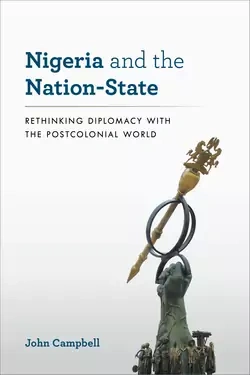
Nigeria and the Nation-State
Rethinking Diplomacy With the Postcolonial World

Former Ambassador John Campbell illustrates the history and importance of Nigeria, a country too often overlooked by the West.
- Book
- Foreign policy analyses written by CFR fellows and published by the trade presses, academic presses, or the Council on Foreign Relations Press.
American diplomacy currently fails to recognize the diffuse nature of power in Nigeria and other postcolonial states, says John Campbell, Ralph Bunche senior fellow for Africa policy studies at the Council on Foreign Relations (CFR) and former U.S. ambassador to Nigeria, in his new book, Nigeria and the Nation-State: Rethinking Diplomacy With the Postcolonial World.
“Nigeria matters to the United States and to the world . . . with its already huge and rapidly growing population—estimated to become the third largest in the world by the end of the century—it is only going to become more, not less, important,” writes Campbell. “A productive relationship will require a reassessment of who U.S. diplomats should talk to, what they should focus on, and how they should assess and carry out their responsibilities.”
More on:
In the book, Campbell traces the fractured colonial history, contemporary ethnic conflicts, and political corruption that define Nigeria today. He argues that Nigeria is not—and never has been—a conventional nation-state. U.S. diplomats should focus more on working with traditional, religious, and local leaders where real power often rests, and less with foreign ministries and weak heads of state.
“In making [the] assumption—that Nigeria, for all its differences, still behaves like a nation-state—American policy makers and diplomats tend to overlook the dysfunctional relationship between the Abuja government and parts, maybe most, of the Nigerian public,” notes Campbell.
The book inspires “a rethink with respect to our own preconceptions and assumptions about how other countries function, especially postcolonial states, in Africa and elsewhere.” The author warns: “As we have learned in Vietnam, Afghanistan, and Iraq, the consequences for misunderstanding the internal dynamics of a country—and not just how it fits into our foreign-policy goals—can be disastrous.”
“To engage effectively with Nigeria—and with any state—requires a grasp of its past,” says Campbell. “The Western idea of a nation-state presupposes a kind of relationship between the government and the governed that is often absent in postcolonial, multiethnic countries dominated by rapacious elites.”
Campbell offers four lessons for U.S. diplomacy toward Nigeria:
More on:
- History matters, especially as remembered by religions and ethnic groups. “Nigeria’s history is characterized by colonialism, military rule, and incomplete modernization, which in turn leads to unresolved tensions among the nations, tribes, clans, and communities that make it up.”
- Conventional thinking that all states are nation-states will not do. These assumptions, “uncritically applied by American political leaders to Afghanistan, Iraq, and Vietnam, have contributed to America’s foreign-policy failures.”
- A different kind of engagement with postcolonial, multiethnic states is needed. “Nigeria shows that a diplomatic focus on capitals is no longer good enough. Instead, a more decentralized approach that reaches subnational political, religious, and ethnic leaders is increasingly necessary to build a productive partnership,” Campbell argues. The U.S. embassy and consulate in Nigeria must “expand their contacts with increasingly influential governors, religious leaders, entrepreneurs, and traditional rulers.”
- Humility and self-reflection are in order. “Too much criticism is based on the expectation that Nigeria and other developing countries ought to act more like conventional, modern nation-states. The limitations imposed by history are ignored.”
The author advises the United States to “support the unity of Nigeria, even if it is loose, even chaotic.” He warns: “The alternative, a breakup of Nigeria into ethnically denominated polities, would be a humanitarian disaster, almost certainly involving the United States in ways difficult to foresee.”
“Nigeria deserves a rethink. So, too, do other postcolonial countries,” concludes Campbell. “The accelerating decentralization of political power in Nigeria suggests that U.S. engagement, too, should include state, local, and traditional centers of powers.”
In the News
Baraza Recap with Ambassador John CampbellUniversity of Florida Center for African Studies
Rebooting U.S. Diplomatic Engagement in AfricaWorld Politics Review
Nigeria & The Nation State: Rethinking Diplomacy with the Postcolonial WorldYale MacMillan Center
Former US Envoy Calls for Nuanced DiplomacyVoice of America
A former ambassador says the US needs to reimagine its engagement with a modern NigeriaQuartz Africa
 Online Store
Online Store